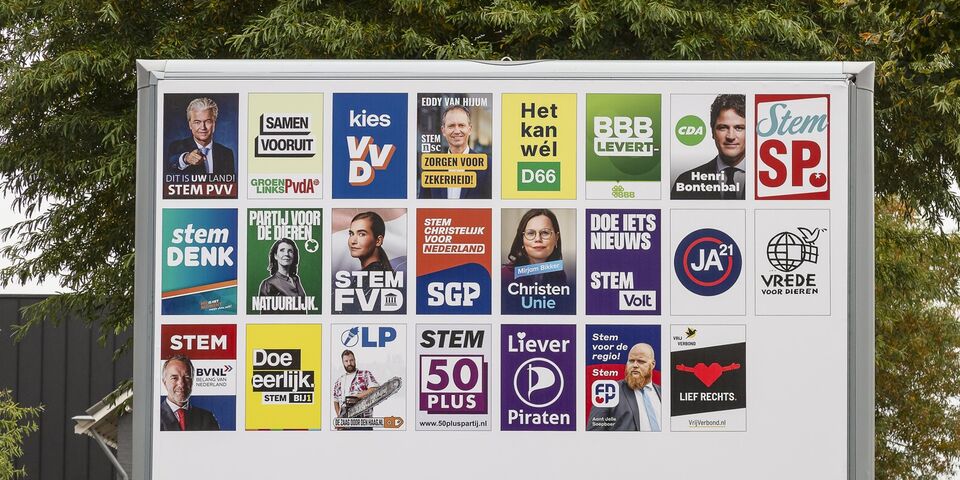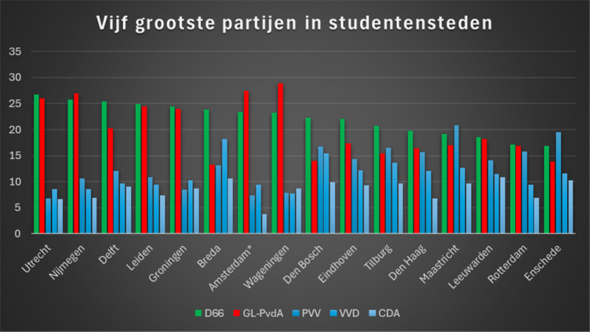No party gained as many seats in the university cities as Rob Jetten’s D66. On average, the party captured 22% of the vote in sixteen university and college cities, compared with nearly 16% nationally.
In Eindhoven, D66 won the elections with 22.2% of the vote. GroenLinks-PvdA received 17.4%, while PVV followed with 14.3%. In Utrecht, Nijmegen, and Delft, more than a quarter of voters backed D66.
GroenLinks-PvdA also performed relatively well, averaging 20% in the university cities. In Amsterdam, Wageningen, and Nijmegen, the left-leaning merger party even topped the polls. In Leiden, Rotterdam, Leeuwarden, Utrecht, and Groningen, it was less than a percentage point behind D66.
PVV trails at an average of 13%, but is the leading party in Maastricht and Enschede, according to the preliminary results. More than 99% of votes have now been counted.
TU/e students
Koen Jaartsveld, a Human-Technology Interaction student at TU/e, reacted positively to the preliminary results. “I voted for GL-PvdA myself, but I’m not upset that D66 came out on top. For me, it was really a choice between the two, and the seats ended up fairly balanced.” Jaartsveld sees D66 as a stable centrist party, offering more prospects for a government that can last. He acknowledges that he is in a center-left bubble at the university. “People around me are happy with the results. I don’t know many people who are unhappy.”
He also expects positive implications for education. “D66 is generally more supportive of education. The chances of major budget cuts seem small. Left-leaning cabinets are usually more likely to support universities. Right-wing parties tend to be skeptical of intellectuals, so this is actually good news for the university.”
Oliver Zweep, a student of Applied Physics and Mathematics, is also fairly satisfied with the results, even though he voted for the CDA. “I’m hoping for a center-right government. I live in a big student house, and I hear a lot of D66, VVD, and even some JA21.” He hasn’t really delved into party positions on issues affecting academia. “I mainly followed the debates on the big topics and just looked to see if the parties said anything sensible and if it sounded logical.”
Frerik Zandhuis, a master’s student in Automotive Technology, is mostly disappointed that the PVV is still doing so well. “Luckily, it’s not as bad as last time. I’m glad that things are at least moving a bit more progressive and left-leaning.” He voted for the PvdD. “What really stood out to me was that they genuinely focus on defending groups who have less of a voice.”
Zandhuis expects the four largest parties, excluding the PVV, to be able to form a government, though he thinks it could take a year and a half to reach an agreement. “That still makes me happier than the previous government,” he concludes.
“Big opportunities”
That D66 has won seventeen seats doesn’t mean the National Student Union is celebrating. “We’ll be keeping a close eye,” said chairperson Maaike Krom in The Hague. She still wants to see whether the basic student grant will actually increase.
Sarah Evers of the Intercity Student Consultation sounded a bit more optimistic. With D66 in government, she sees “big opportunities” for the basic grant, a mandatory internship allowance, and reversing the cuts made by the Schoof cabinet.
BBB, SGP, and Volt
The preliminary results also show that parties like BBB and SGP receive little support in university cities. Caroline van der Plas received just 1%, compared with 2.7% nationally. Chris Stoffer of the SGP fared even worse, with 0.3% locally versus 2.3% nationwide.
For Volt, the results in university cities were disappointing. Laurens Dassen’s party averaged 1.9%, just 0.8 points higher than in the rest of the country, leaving the party with only one seat.
What’s next?
Not all votes have been counted yet. According to the latest nationwide tally, D66 leads with 16.9%, narrowly ahead of PVV with 16.7%. Both results would translate into 26 seats. VVD is in third place with 14.2%, followed by the joint GL-PvdA list with 12.7%.
The official results will be announced next Friday by the Electoral Council, but the party leaders will meet to discuss the outcome as early as tomorrow.
This article was translated using AI-assisted tools and reviewed by an editor.



Discussion